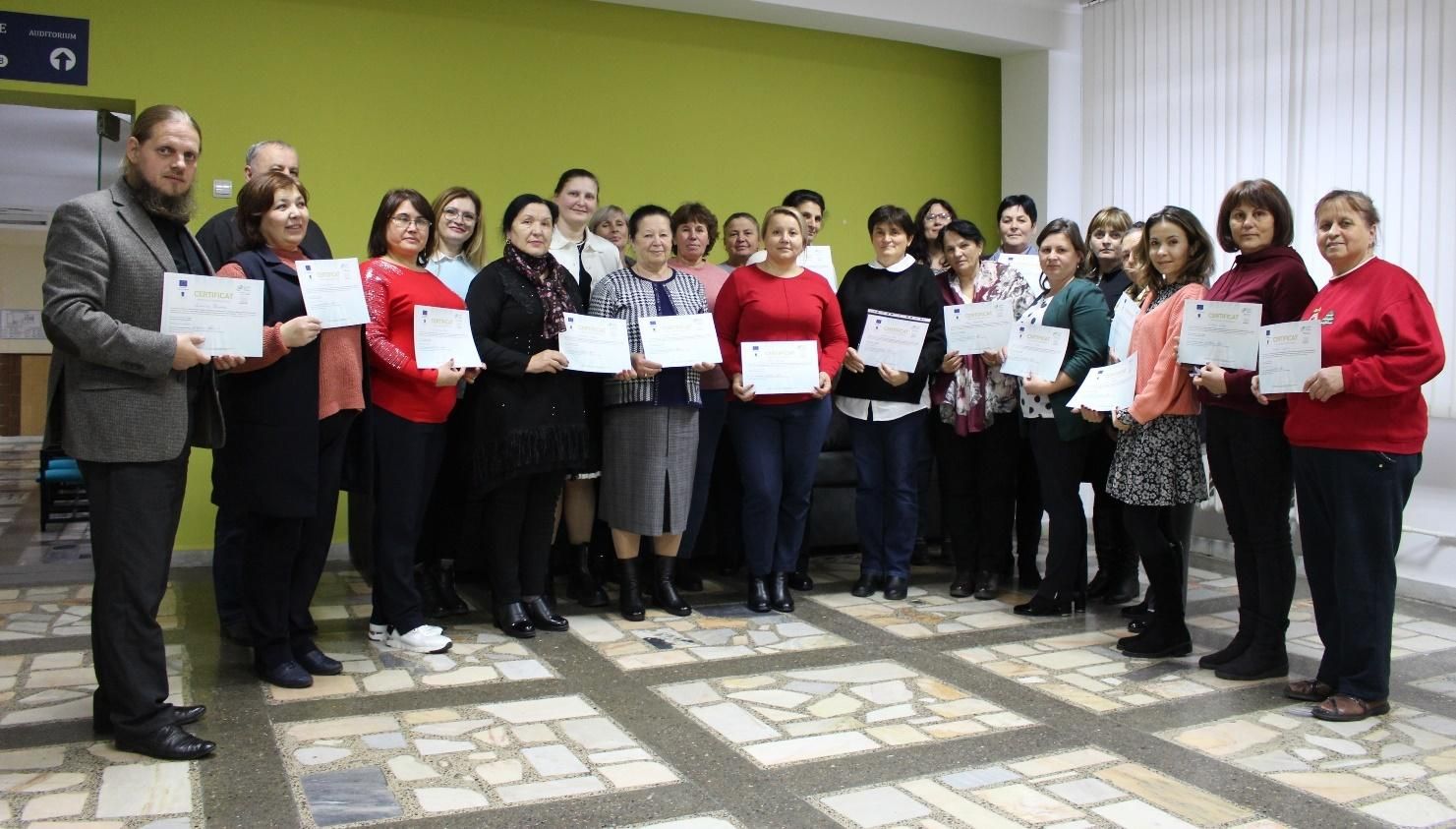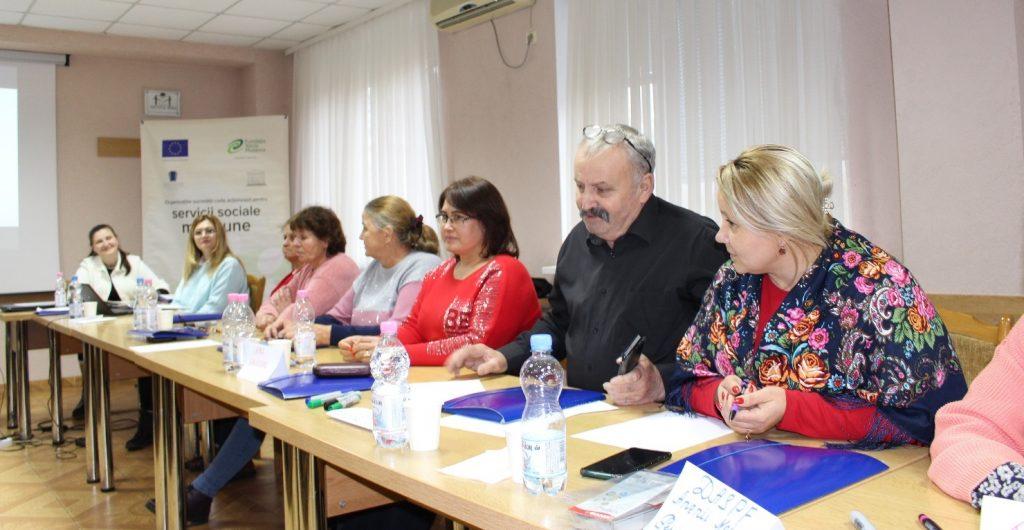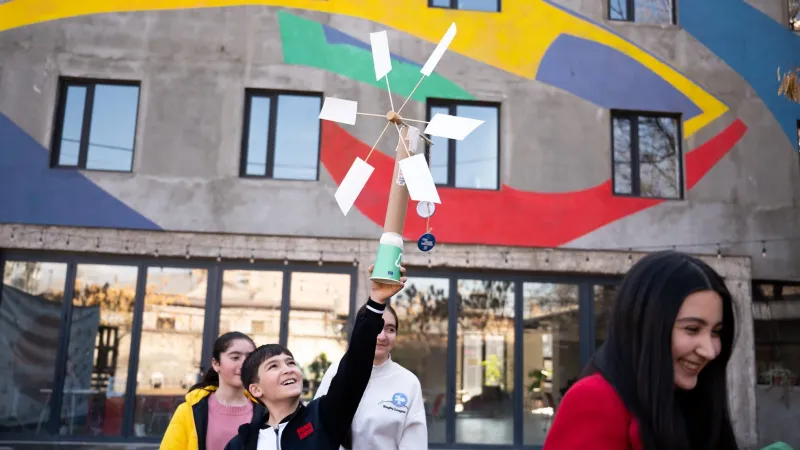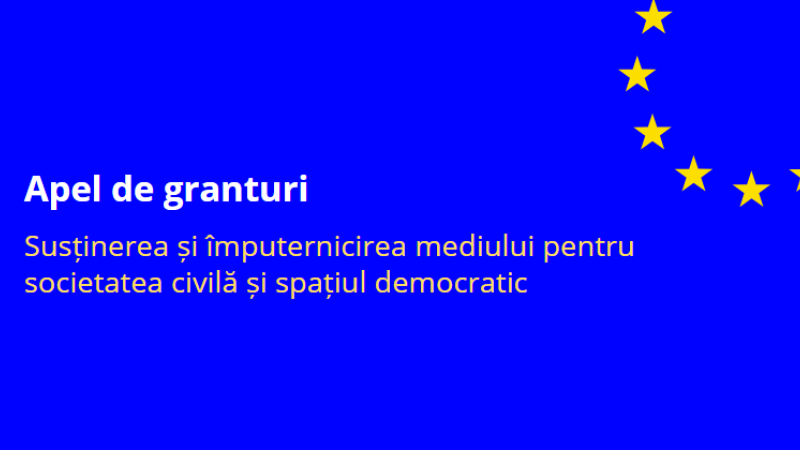
22 de angajați ai centrelor de zi și de plasament pentru persoane vârstnice din Republica Moldova au fost instruiți cu suportul unui proiect al UE
Angajați din trei centre de zi pentru persoane vârstnice din raioanele Cimișlia, Fălești și Soroca și din centrul de plasament Puhăceni, raionul Anenii Noi, au participat, timp de cinci zile, la un curs de instruire inițială pentru specialiștii care prestează servicii sociale pentru persoane vârstnice, organizat de Keystone Moldova. Serviciile sociale menționate sunt dezvoltate și extinse cu sprijinul proiectului „Organizațiile societății civile acționează pentru servicii sociale mai bune”.
Sub îndrumarea consultantei Keystone Moldova Nelea Panfil, participanții au însușit noțiuni de bază privind legislația și drepturile persoanelor vârstnice, cadrul normativ privind funcționarea centrelor destinate vârstnicilor, modul de organizare și gestionare a serviciului social, pregătirea pentru acreditarea serviciului. De asemenea, prin intermediul lucrului în grup și schimbului de opinii, participanții și participantele au exersat aplicarea managementului de caz, inclusiv întocmirea planului individual de asistență, întocmirea și păstrarea dosarelor beneficiarilor etc.
„Lucrez de 13 ani la Centrul multifuncțional de asistență socială pentru persoane vârstnice din s. Glinjeni, r- nul Fălești, unde dezvoltăm în prezent un serviciu social Centru de zi. Deși avem deja o anumită experiență, îmi dau seama că nu am avut până acum proceduri clare pe care să le urmăm la întocmirea dosarului beneficiarului. La instruire, am identificat unii factori de risc care ar putea pune în pericol viața și sănătatea beneficiarului, am stabilit care sunt principiile de organizare și funcționare a unui serviciu, am exersat cum se face corect un plan individualizat de asistență, cu unele obiective din care reies câteva acțiuni, am învățat cum se formulează corect un obiectiv. De asemenea, ne-a fost demonstrat un alt model de acord de colaborare în care sunt specificate obiectivele, drepturile și obligațiile beneficiarului și prestatorului de servicii. La întoarcere la serviciu, vom modifica neapărat acordurile pe care le avem în prezent cu beneficiarii, în corespundere cu managementul de caz și cu standardele minime de calitate”, a mărturisit, după instruire, Nina Covaliuc, reprezentantă a Asociației „Sat Modern”.
Un alt participant, Ghenadie Pereteatcu, primar al s. Băxani, r-nul Soroca, dezvoltă în prezent serviciul social Centru de zi pentru persoane vârstnice, care ar urma să aibă cel puțin 70 de beneficiari, selectați din cei în jur de 200 de vârstnici din sat. „Le vom oferi ocupații, activități culturale și de petrecere a timpului liber, pe scurt, îi vom motiva să zâmbească și să se simtă bine! Le vom oferi, de asemenea, câte un prânz cald. Pentru început însă, avem de lucrat la pregătirea Serviciului pentru acreditare inițială. Am învățat aici foarte multe lucruri utile. Cel mai mult m-a impresionat modalitatea de formulare a obiectivelor. Conștientizez că este nevoie să particip sistematic la cursuri de formare”, spune Ghenadie Pereteatcu.

La Puhăceni, r-nul Anenii Noi, Centrul de plasament pentru vârstnici se află în plină reformă. Instituția se reorganizează din azil în centru de plasament. „Trecând prin procesul de reformă, a apărut necesitatea să organizăm activitatea altfel și să învățăm multe lucruri noi. Interesul nostru acum este ca Serviciul să fie acreditat. Am luat cunoștință ce înseamnă asta, cum trebuie să ne pregătim, ce documente să perfectăm. Am venit la instruire cu o parte din echipă, patru persoane, ca toți să fim instruiți și să știm cum să lucrăm corect de acum încolo”, spune Fiodor Nicoară, managerul Centrului.
Aliona Televca, asistentă socială în cadrul Centrului de zi din satul Selemet, r-nul Cimișlia, spune că instruirea i-a oferit o claritate în ce privește organizarea și sarcinile activității sale cu beneficiarii. „Uneori la noi ajungea dosarul beneficiarului și nu eram sigură ce trebuie să conțină și ce trebuie noi să adăugăm. Se întâmpla că încercam de la zero să fac totul, să completez dosarul. Dar acum am înțeles că asistentul social comunitar trebuie să ne aducă o bază destul de puternică, după care noi, la centru, realizăm alte evaluări și intervenții. Pentru mine instruirea a însemnat claritate. Acum am înțeles pașii concreți pe care trebuie să-i fac. Chiar vreau să menționez că în valiza mea de cunoștințe, cu care am venit aici, era amestecat totul. Acum, la plecare, după 5 zile de curs, pot să spun că ea arată ca un organizer – totul e pus pe secții, separat și clar. Ce mi-a plăcut e că la fiecare subiect ne-am implicat fiecare și am exemplificat fiecare pas, astfel, ne-am regăsit în situațiile colegilor și am făcut schimb de opinii. Astfel, știm în diferite situații cum vom proceda”, mărturisește Aliona Televca.
Instruirea inițială pentru personalul centrelor de zi și de plasament pentru persoane vârstnice este organizată de I.P. Keystone Moldova, care este organizație parteneră de implementare în cadrul proiectului „Organizațiile societății civile acționează pentru servicii sociale mai bune”. În cadrul acestui proiect, sunt dezvoltate 40 de servicii sociale în diferite localități ale Republicii Moldova.


